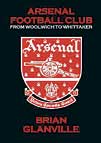 Arsenal Football Club
Arsenal Football Club
From Woolwich to Whittaker
by Brian Glanville
GCR Books, £11.95
Reviewed by David Stubbs
From WSC 296 Oct 2011
Over The Bar
Memories of My Career with Arsenal and Wales
by Jack Kelsey
GCR Books, £12.95
Reviewed by David Stubbs
From WSC 296 Oct 2011
Both of these titles involve journalist and lifelong Arsenal supporter Brian Glanville, who began his literary career aged just 19 when he persuaded Cliff Bastin to allow him to ghostwrite his memoirs. In 1952, aged just 21, Glanville wrote one of the first histories of Arsenal, from 1886 to 1952, when, unbeknown to the author, his team were about to embark on one of the most fallow periods of their history.
All of which makes the chipper enthusiasm with which Glanville delivers his thorough but somewhat worshipful account of the Gunners the more ironic. His zest for the task is marked in his prose style – one yearns to sweep with a scythe through these pages to cut down the excess of exclamation marks, which occur at the rate of roughly three per paragraph. The profiles of players like Ted Drake and Alex James have a cigarette card feel to them, while he glosses over more notorious episodes in the club's history such as their dubious promotion at Spurs' expense. The account is glued together by a series of anecdotes involving star players, which may not to be the liking of modern readers whose taste in humour inclines towards the funny or, at least, the "making sense". Beneath all this, however, you sense a fine writer, stylist and analyst in the early making.
In 1958, Glanville went on to ghostwrite the memoirs of popular and longstanding goalkeeper Jack Kelsey, who joined Arsenal in 1949 and stayed with them for 14 seasons, as well as turning out for Wales. Kelsey's own modesty forbids him from blowing his own trumpet and the matches he relates taking part in are largely defeats, which doesn't help explain the high esteem in which he was held.
Over The Bar is perhaps inadvertently fascinating for the window it opens on the bleakness of the 1940s and 50s, from which professional footballers were, in those maximum wage days, barely exempt. Telephones and planes are unnervingly modern devices. When Kelsey signed for Arsenal he wrote a letter to his parents in Wales, and he recalls an early game when he let in a goal as he was distracted by a plane overhead. Fear of flying is commonplace – following the accident which wiped out the Turin team in 1949, Arsenal charter two aircraft as a sort of spread-bet against disaster.
Poignantly, this book was published in 1958. Black players are "coloured", or when especially black, "coal black", wives are called Myrtle, hobbies include making music boxes. A trip to the old Eastern Bloc is simply a portal to even worse privations. In Prague, the only option of a trip to see the film Romeo And Juliet is scuppered as the cinema is fully booked for six months, while in Moscow players are forced to sleep in a communal hut with Soviet citizens.
To get through this unremittingly grey decade, practical jokes are the order of the day – often rather cruel, as when the author himself phones a fellow player, impersonating a newspaper editor and convinces him he's been commissioned to write an article for five pounds. "The sequel was a little unhappy, for Mike spent his match bonus on the strength of the fiver that never was." Well, yes. But of such haplessness are entertaining reads made.